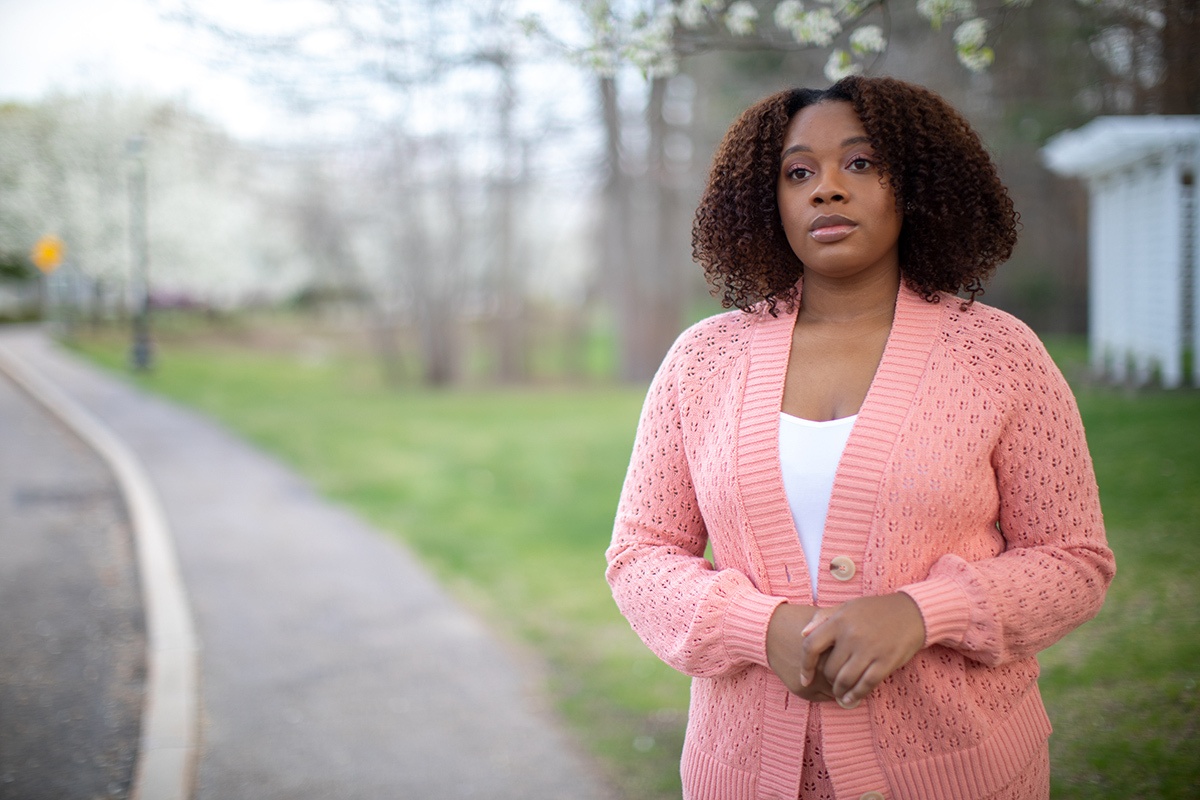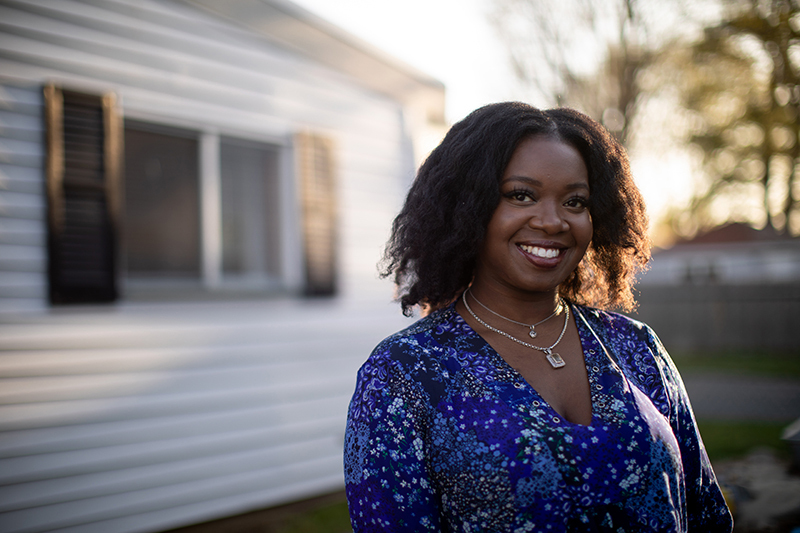Alleviating Stress in a Contact Tracing Workforce
Wellness & Peer Support program helps employees manage rising anxiety, emotional toll of pandemic
Posted on Apr 23, 2021

Every day, contact tracers dial unfamiliar phone numbers, never quite sure what they might confront on the other end of the line. It could be an anxious, homebound senior who has run out of medicine. Or an immigrant mother worried whether her child’s labored breathing is an asthma flare-up, or COVID-19, or both.
Over the past year, workers have reached out to countless strangers offering help through the Massachusetts Community Tracing Collaborative (CTC), a statewide program launched last April through a partnership between the state and Partners In Health. Contact tracers have made more than 2 million phone calls to adults with COVID-19 and their contacts, explaining the latest medical guidance to prevent transmission of the virus. And care resource coordinators have connected more than 90,000 people to food, housing, and other essentials for safe isolation or quarantine.
But what’s the emotional toll on these contact tracers and care resource coordinators, who deal daily with illness, fear, and—sometimes—death. The stress is hard to quantify, but there’s no doubt the work leaves its mark.
That’s why in July 2020, acknowledging that these outreach workers might need to vent, or cry, or even scream once in a while, PIH—with the state’s support—established a unique Wellness & Peer Support program open to every CTC staff member.
Through case surges and lulls, the program has offered a range of supports. There are one-on-one sessions with trained peer support providers, CTC members themselves who listen, share pragmatic solutions, and refer people to mental health professionals when needed. Since the program’s launch, about 1,000 individual peer support encounters have taken place.
And there are one-off and longer-term “Wellness Zones,” which are peer-led gatherings ranging from grief workshops and yoga classes to poetry, cooking classes, and guided meditation.
Dayhana Schlosser, a registered nurse, child and family therapist, and director of the CTC support program, helped build this work from the ground up, including training staff volunteers. “These are people who understand the nature of this work and the personal toll it can take,” she said.
Seeking a Wellness Zone
At first, Wellness Zone uptake was slow, Schlosser said, in particular during surges when it seemed impossible to take time away from the pressing work. By September, though, CTC staff members—possibly feeling the need to bond with others and make meaningful connections—began flocking to the sessions. A survey at that time found that more than 90% of respondents reported that participation had positively impacted their overall health and wellness. That compared to a survey four months prior, in which 20% to 30% of the workforce said they had no idea where to turn for work-related mental health support.
Since the fall surge, there’s been a “significant” increase in Wellness Zone participation, said Schlosser, who started at the CTC as a care resource coordinator. About 500 people joined in around the time of the U.S. Capitol riots on January 6. The average session draws 45 to 50 people.
“I think this has been hugely helpful for many people,” Schlosser said. “There is just a myriad of feelings to process, from needing help talking through a tough call, to facing the huge disparities in the circumstances of the cases, to the personal stuff. A lot of folks in this workforce are grieving themselves, and navigating the work when you've had someone pass away is really tough.”

Schlosser is a registered nurse and child and family therapist. She directs the support program for staff in the Mass. Contract Tracing Collaborative. Photo by Zack DeClerck / PIH
Indeed, these workers are in a unique—and uniquely stressful—situation, said Dr. Giuseppe “Bepi” Raviola, PIH’s director of mental health. They were hired quickly, during a crisis, and placed in the position of being quasi-health workers, when many were not actually health workers. Raviola says early on there was an aggressive push to provide Psychological First Aid training for contact tracers so that they could effectively address the acute mental health and psychosocial needs of people affected by COVID-19. But it soon became clear that some contact tracers themselves were “enduring significant distress” as they supported people remotely and dealt with high levels of physical illness, economic challenges, and personal losses caused by the pandemic. These new hires, he said, needed a dedicated space “to buffer them and provide initial support.”
A Breaking Point
Paula Bowden Alayne, of Sacramento, CA, was among the first cohort of contact tracers hired in mid-April 2020. She’s no stranger to on-the-job stress; she previously worked as a training officer in San Quentin prison teaching corrections staff how to treat death row inmates more humanely.
But after six months as a contact tracer, Bowden said, the reality of the work became oppressive. “Talking to people who are sick and potentially dying was getting to be too much,” she said. “It got so it was hard for me to get out of bed. I felt overwhelmed. I think I was getting depressed—like mine was part of a community depression. It was bad and getting worse.”
There were some cases Bowden just couldn’t shake, like one couple on her call list. He was positive, she was waiting to see if she’d been infected. Bowden checked in daily. On Monday, Tuesday, and Wednesday, things were stable. On Thursday, no one answered the phone. Same on Friday. On Saturday, the wife picked up. Her husband had died that morning. “That was kind of my breaking point,” she said. But she’d committed to the job, and she needed the income.
Bowden reached out for help and was quickly connected to a CTC peer support person. “We had a conversation, she listened and empathized,” Bowden said. “She gave me a choice: ‘You can walk away from this, or stay.’ It was so powerful to sit with someone who had done this job, knew the ins and outs. She gave me permission to do what I needed to do. That permission and our conversation gave me all the power back, my depression lifted, and I got my energy returned. I kept doing the job.”
Soon after, Bowden applied to become a peer support person herself. She says this position has allowed her to lean in even further to the meaningful work of helping people, both at the individual level and through the groups she leads, such as a six-week session on managing grief.
Bowden recalled working with a staff member who was feeling hopeless, with tremendous difficulty making calls due to a death in the family. Bowden, with her experience practicing meditation, helped this individual begin to work through the personal grief and feel more grounded, she said, “like life had meaning again.”
Rising Depression and Anxiety
To be clear, members of the peer support team are not trained psychiatrists, therapists, or counselors; when they suspect even the slightest indication of more serious mental illness in a peer, they can elevate concerns to Schlosser and also refer people to professionals and follow up to make sure no one gets lost in the system.
The mental health toll of COVID-19 has been pervasive, with about 4 in 10 adults in the U.S. reporting symptoms of anxiety or depressive disorder, up from 1 in 10 in the pre-pandemic period, according to a Kaiser Family Foundation survey. Many adults report a range of negative impacts on their mental health and well-being, such as “difficulty sleeping or eating, increases in alcohol consumption or substance use, and worsening chronic conditions, due to worry and stress over the coronavirus.” Among adolescents, rates of suicidal thinking and attempts were up by 25% or more during several months in 2020 compared to similar periods in 2019, an analysis of patients, ages 11 to 21, found.
This rising stress is a worldwide phenomenon. Since the start of the pandemic, PIH global staff have expressed similar concerns about the increasing distress faced by health care and other providers, Raviola said. So, the peer support model developed in Massachusetts is now being adapted to meet the needs of global colleagues, from Lesotho and Peru to Mexico and Malawi.
Raviola said with the inequities that COVID-19 has further exposed, from structural racism to political extremism and economic disparities – in combination with various stresses related directly to COVID-19 itself – all sites should have staff support programs in place: “We can't afford not to do it since health care workers will continue to be at the convergence of these issues.”
Emotional First Aid
Accompanying patients through some of their toughest moments has kept Nikkia Watson, 28, motivated over the past year. A graduate student in clinical social work at Simmons University, Watson signed on to be a care resource coordinator with the CTC in late April 2020 while also interning at a VA facility outside Boston in the hospice and palliative care unit. By July, Watson had joined the peer support team, devoting half of her time to offering emotional aid to a range of people.
“Mostly, I provide concrete steps to calm anxieties,” Watson said. “This work is really hard, plus all of us are dealing with emotions and issues in the lives we live outside of this.” In this role, Watson has worked on confidence-building skills with a young contact tracer having trouble coping with competing demands, and she helped an older woman struggling in secret with anxiety to connect with a mental health provider. “I have definitely referred people to get professional help,” Watson said. We’re not here to be therapists, we are here to make people feel better about the work.”
All of it, even the moments that are crushing, have been deeply satisfying, she added.
“For me personally, and for the folks we’ve helped, it’s the first time people have seen a work environment that is caring—not only caring about productivity, but caring about their mental health. Most folks are coming from a setting where it’s, ‘Do your job and whatever your problems are, deal with that on the outside.’ What’s unique here is we care about what’s going on; how can we make you feel seen, validated, supported. Those aren’t things you usually get at a job.”
As the pandemic appears –perhaps – to be winding down in Massachusetts, Watson has been considering her own future goals. “I’ve seen a lot of grief,” she said. “I’ve seen people just diagnosed and then I’ve seen them hospitalized, and also in the end, going to hospice and dying. It’s a full circle experience that you don’t often get to see. I talk to them at the beginning and see them at the end, and all of this makes me want to be part of the healing profession even more. I think hospice is going to be my new thing.” She adds: “It’s amazing to support people in their darkest times. It’s laborious sometimes, but it’s also so gratifying.”

